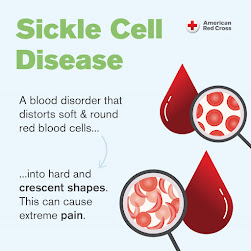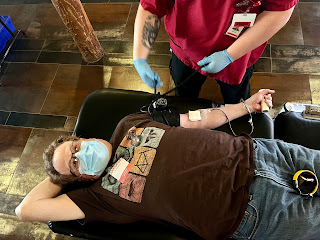The sickle cell trait: action after an unexpected match
By Jennifer Costa, Regional Communications Director
LEWISTON – For the Rands of Lewiston, Maine, donating blood has become a family affair. Phyllis Rand, a Government Operations Manager and Community Volunteer Leader, is no stranger to the American Red Cross. She’s served the organization for more than 13 years and has deployed to countless natural disasters across the country. Last fall, she tried something new.
“I donated blood successfully for the first time in October,” she said. “A few weeks later I received an email from the Red Cross telling me that my blood was compatible for transfusions to people who have sickle cell disease.”
Phyllis was surprised to learn that she was a match.
“I told everyone I knew, including my fellow Red Crossers. I sent them emails along with the email I received from the Red Cross – and told them how excited I was about it. I felt like it was a gift and a privilege to be able to help other people just by donating my blood,” Rand said.
In the U.S., it’s estimated that more than 100,000 people are living with sickle cell disease. According to the CDC, it occurs in 1 in 365 Black or African American births. Regular blood transfusions provide lifesaving treatment for these patients by increasing the number of normal red blood cells in the body, helping to properly oxygenate it and unblock blood vessels. Depending on the severity of the disease, a sickle cell patient may need as many as 100 units – or about 12 gallons – of blood each year. Frequent transfusions can make finding compatible blood types more difficult as patients can develop an immune response against blood from donors who are not a close match. Fortunately, one in three African American blood donors – just like Phyllis – are a match for people with sickle cell. Donations from individuals who are Black and do not carry the sickle cell trait are often the most compatible blood products for sickle cell patients.
“People of African descent statistically make up a pretty low population of the blood donors at the Red Cross,” noted Rand. “We need to improve that. We need to encourage more people of African descent to help, not just patients with sickle cell disease, but all patients in need.”
So for Rand, the discovery of her match, needed to extend beyond her own donation.
“I decided I was going to run my own blood drive,” she said.
 |
| Phyllis Rand at her Juneteenth Blood Drive |
“It was important to me to do something to help to commemorate the first federal recognition of Juneteenth,” said Linda Rand, Phyllis’ daughter. “This idea that society is taking Juneteenth as a call to service, community outreach and getting involved in the community.”
Linda seized the opportunity to support her mom’s community efforts and rolled up her sleeve for the first time.
 |
| Linda Rand, first-time blood donor |
“I was a little bit nervous, but it’s not too bad. It’s easy and it’s actually kind of relaxing,” she said, vowed to make blood donation a regular thing.
As Linda chatted with the phlebotomist who was placing the needle, her dad was by her side, rolling up his sleeve for the first time too. Phyllis joined her family on another donation bed as her son – and his band – serenaded all the donors throughout the day. The drive collected enough blood to help up to 100 patients in need.
“It means that I found a way to help a lot of people by encouraging these donors to come through the door and it’s just a gratifying feeling,” said Rand.
The blood that runs through our veins can ease the suffering of others. Patients battling sickle cell disease need your help now. Please schedule a blood donation appointment today by visiting RedCrossBlood.org, using the Blood Donor App or calling 1-800-RED CROSS.
Joined by Blood
In recognition of Sickle Cell Awareness Month this September, the American Red Cross launched Joined by Blood, a fall-focused component of our Sickle Cell Initiative, in September – October 2022. During this time, the Red Cross is teaming up with partners in the Black community, like the National Pan-Hellenic Council and others, to rally blood donors who are Black to support the blood transfusion needs of patients with sickle cell.
To learn more, visit RedCrossBlood.org/OurBlood.






%20(1).jpg)
Comments
Post a Comment